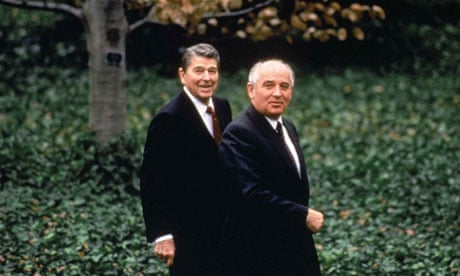When the Soviet Union collapsed, it left behind 6,623 nuclear warheads on land-based missiles and 2,760 warheads based at sea, plus 822 nuclear bombs, 150 cruise warheads, 15,000 tactical nukes scattered far and wide, 40,000 tons of chemical weapons and uncounted tons of anthrax spores. Enough weaponry of mass destruction, in short, to destroy Planet Earth many times over. How did Moscow (and Washington, of course) reach such insane levels of mutually assured suicide? David E Hoffman, a seasoned Washington Post international reporter, sets out to explain it in a vivid dissection of paranoias past: but, time and again, this Pulitzer prize-winning chronicle seems more than mere history as today's paranoias resound.
Who remembers what it was like to live through the decades of cold war? Not anyone under 40, for a start. Our chancellor of the exchequer wasn't out of his teens when the Berlin Wall came down. Our prime minister hadn't left Eton as Mikhail Gorbachev began his rise to power. Two generations distance us from the postwar age of constant apprehension. Yet who is this deputy director of the CIA in these pages, forever getting his assessments wrong, forever failing to see glades of glasnost amid the old forests of fear? Why, it's Robert Gates, now (just) defence secretary for Barack Obama, as he was for George W Bush. Because time moves on, it doesn't mean that closed minds do the same.
So many of us got so much wrong through the years of fear. Polite opinion in Britain (my own included) quavered and cringed when Ronald Reagan became president of the United States. We saw a bemused ex-actor peddling conservative bromides. We saw a man who wasn't clever enough, or experienced enough, to stack Pershing 2s against Moscow's Pioneers. We prophesied doom. And yet – for very good reasons – Reagan, like Gorbachev, is a hero in Hoffman's eyes.
Gorbachev, surveying the geriatric rubble of Soviet leadership, decided that everything must change, including a heedless arms race, run by the generals for the generals, that was bankrupting the country. And Reagan, shocked to the core when he realised how defenceless America was, how one malign Soviet strike or bungled push of a button could obliterate everything, had either the wisdom or the naivety to try something that his own generals (and Gates) thought foolishly impractical: slashing cuts in the nuclear arsenal and/or building strategic missile defence systems, aka Star Wars.
Hoffman lets his saga of war and peace unroll through the eyes of those on both sides who were there at the time. In particular, tramping the length and breadth of the old USSR, he tells us how a fading, failing Kremlin leadership consistently feared an American strike that Reagan, of course, knew wasn't coming. Doomsday came perilously close by accident and mutual misunderstanding; but, rationally, it was never on the cards. Did the CIA, with all its billions of dollars spent, have one good spy near the top of the Soviet tree? No: not one. Did Brezhnev, or Andropov, or Gorbachev have the intelligence feedback from the US that might have produced moments of calm reflection rather than convulsions? Yet again, no.
A few spies and defectors made a difference. Oleg Gordievsky does his canary act for Hoffman's benefit. Vladimir Pasechnik, the micro-biologist who revealed so much about secret germ warfare programmes, clearly altered the course of late events. But the brutal fact is that, through the toils of Brezhnev and beyond, neither of the superpowers either understood or had any meaningful contacts with the other. And the dismal truth beyond that is that neither side saw a reason to pause and engage brain – as opposed to panicking over flimsy bits of "intelligence". Basic assumptions were rigid, the opportunity for fresh thought to alter them was grimly limited. This war was not so much cold as deep frozen.
Gorbachev needed to end it because the cost of defence, rising blindly as the army ordered more and more missiles, was bankrupting the Soviet Union. Its economy, stuck in the mud and mired in congenital secrecy, couldn't cope anyway, but the burden of defence profligacy was forcing it to its knees. Reagan needed to end the race because he came to believe (as his "evil empire" rhetoric faded) that it was an evil in itself, a calamitous accident waiting to happen. And so, with many lets, hindrances and stumbles, the arms race slowed, then went into reverse. That couldn't save Gorbachev: perestroika was too harsh a medicine for the economy to take. But his fall, amid the disintegration of Soviet communism itself, was the seismic event of the late 20th century.
Just history, though. An upheaval registered and forgotten? As Hoffman weaves in the story of how the Soviet Union, through its covert Biopreparat agency, secretly went on with massive research into germ warfare long after Richard Nixon and the west had abandoned it, he enters a chill caveat. Gorbachev may or may not have known what was going on. Yeltsin certainly didn't. There was no command and no control as Russia lost its satellite states and Iranian and Iraqi middle-men came shopping for anthrax or leftover uranium. The seeds of a new paranoia were sown.
But was that paralleled by a new emphasis on high-class intelligence, on convincing information for an information age? Ask Tony Blair, George W Bush or the shade of Saddam. Ask Dick Cheney, as locked in a chamber of prejudices during the Gorbachev era as he was as US vice-president two decades on. No: Hoffman's magisterial, human, vividly readable account of a remarkable time doesn't stop in 1991. Indeed, you could say that Dead Hand 2 is almost written.
Peter Preston's 51st State is published by Penguin.

Comments (…)
Sign in or create your Guardian account to join the discussion